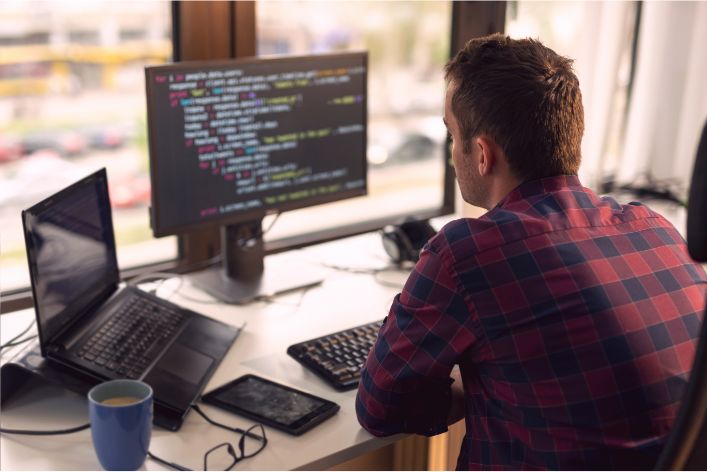Handling frustration is a crucial part of the learning process, especially when it comes to coding lessons. Frustration can happen when we encounter issues while working on a project or when we can’t seem to understand a particular concept. The effects of frustration can be detrimental to our learning process, often leading to discouragement and even quitting.

The aim of this blog post is to provide tips and strategies for handling frustration during coding lessons to help you overcome obstacles and become a more confident coder.
Understanding Frustration
Frustration is a common and normal part of the learning process, especially when it comes to coding. Despite the popular belief that coding is all about logic and linear thinking, frustration often arises during the learning process. Understanding what frustration is and its causes during coding lessons can help beginners to handle it properly. Listed below are some key insights into understanding frustration while learning to code:
Definition of Frustration and Its Causes during Coding Lessons:
- Frustration can be defined as a feeling of disappointment or being thwarted when trying to reach a goal. In coding, this often occurs when learners encounter syntax errors or when they are unable to solve a problem.
- Coding requires a lot of concentration and problem-solving skills, which can be challenging for beginners. The frustration is often caused by the complexity of the coding language and the struggle to understand it.
- Other factors that contribute to frustration during coding lessons are lack of motivation, inadequate support, and difficulty in grasping challenging concepts.
Read: How to Learn Coding through Gaming
Common Experiences of Frustration while Learning to Code:
- One common experience of frustration is when learners encounter bugs or syntax errors. These errors can be difficult to detect and fix, which can prolong the coding process.
- Another frustrating experience is when learners are unable to solve a coding challenge or unable to understand a complex concept.
- Frustration can also arise when learners feel stuck or overwhelmed, which can lead to a loss of motivation and interest in coding.
Importance of Identifying and Acknowledging Frustration:
- It’s important to identify and acknowledge frustration during the learning process, as failure to do so can lead to burnout and giving up.
- Ignoring frustration can lead to feelings of helplessness and hopelessness, which can ultimately hinder a learner’s progress.
- Recognizing frustration as a natural part of the learning process can help beginners to persevere and find ways to overcome it.
Overall, frustration is an inevitable part of the learning journey when it comes to coding. However, understanding its causes and identifying it early on can help learners to manage them effectively and continue to make progress in their learning. By acknowledging frustration and finding ways to overcome it, beginners can build resilience and ultimately become successful coders.
Read: What are Coding Algorithms and How to Master Them?
Tips for Handling Frustration
- Take a break: When you’re feeling frustrated, it’s important to take a step back from your work and give yourself a break. This can help you clear your mind and come back with a fresh perspective.
- Practice self-care: Learning to code can be mentally and physically exhausting. Taking care of your mind and body can help make the process easier. Make sure you are getting enough sleep, eating well, and engaging in regular physical activity.
- Change the scenery: Sometimes, all you need is a change of scenery to help you refocus. Try moving to a different study location, such as a coffee shop or library. This can help you feel refreshed and ready to tackle the material again.
Learning to code can be a rewarding experience, but it can also be frustrating at times. As you work through complex concepts and challenging projects, it’s important to learn how to handle frustration in a productive way. Here are three tips to help you manage your frustration and stay on track:
Read: How to Transition into a Coding Career
Take a break
When you’re feeling overwhelmed and frustrated with your coding work, it’s important to give yourself a break. Getting up and walking around, doing some stretching, or even just stepping outside for some fresh air can do wonders for your mental state. Taking a break helps you clear your mind and come back to your work with a refreshed perspective.
Practice self-care
Learning to code can be mentally and physically exhausting. Make sure you are taking care of your mind and body to help ease your frustration. This means getting enough sleep, eating well, and engaging in regular physical activity. Taking care of your physical and mental health allows you to stay focused and motivated throughout your coding journey.
Change the scenery
Sometimes, simply changing your environment can help break up the monotony and frustration of coding. Try working from a new study location, such as a coffee shop or library. This change can help you feel refreshed and reinvigorated, which can in turn make your coding work feel easier and more enjoyable.
Learning to code can be a challenging and frustrating process at times. However, with these three simple tips, you can manage your frustration in a productive way and stay on track toward achieving your coding goals. Remember to take a break when you need one, practice self-care, and switch up your environment when you start to feel stagnant. With these tools in your arsenal, you’ll be better equipped to tackle any coding challenge that comes your way.
Read: How to Learn Coding for Free: Top Resources
Strategies for Overcoming Frustration
Learning to code can be an incredibly fulfilling and empowering experience, but it can also be extremely frustrating. As you encounter errors and challenges, it’s easy to feel defeated and discouraged. Fortunately, there are a few strategies you can use to help manage your frustration and keep moving forward.
Break Tasks Down into Smaller Steps
- When faced with a daunting coding task, it’s easy to feel overwhelmed and frustrated.
- To combat this, try breaking the task down into smaller, more manageable steps.
- Focusing on one small piece of the puzzle at a time can help reduce your frustration and increase your sense of accomplishment as you complete each step.
Find New Ways to Approach the Coding Problem
- If you’re stuck on a coding problem, it can be helpful to step back and approach the problem from a different angle.
- Try researching similar problems and their solutions, or brainstorming new ways to tackle the problem.
- By exploring different options, you may discover a solution that you wouldn’t have thought of otherwise.
Read: What Job Opportunities Await After Learning Code?
Try Not to Compare Yourself to Others
- One of the biggest sources of frustration for new coders can be comparing themselves to more experienced programmers.
- Remember that everyone starts at the beginning, and everyone makes mistakes.
- Focus instead on your own progress and learning journey, and be proud of any new skills or knowledge you acquire along the way.
Take a Break and Come Back with Fresh Eyes
- If you’re feeling particularly frustrated with a coding task, it’s important to take a break and step away from the computer.
- Go for a walk, do some exercise, or simply take a few moments to clear your mind.
- Returning to the task with a fresh perspective can help you see the problem in a new light, and may even lead to a breakthrough in your understanding.
Remember that frustration is a normal and expected part of the coding learning process. By implementing these strategies, you can learn to manage your frustration and keep moving forward toward your coding goals.
Read: How to Use GitHub for Coding Beginners
Conclusion
Learning to code can be a frustrating experience, especially when you encounter difficult problems. It’s important to acknowledge and address that frustration, as it can impact your motivation and progress.
First, take a step back and breathe. Try to identify what’s causing your frustration – is it a difficult concept or a bug in your code? Once you’ve identified the problem, break it down into smaller parts and tackle each one individually.
If you’re still stuck, don’t hesitate to ask for help. Reach out to a mentor, fellow coder, or online community for support and guidance. Remember, everyone in the tech community started as a beginner at some point.
Another strategy is to take a break and come back to the problem later with fresh eyes. This can give you a new perspective and help you identify solutions that you wouldn’t have thought of before.
Remember that learning to code is a process, and progress won’t always be immediate. Persistence is key – keep working at it, even if it feels like you’re not making any progress. Remind yourself of the reasons you started learning to code in the first place.
On a final note, acknowledging and addressing frustration is important when learning to code. Problem-solving, reaching out for help, taking breaks, and persistence can all lead to progress. Don’t give up – keep learning and growing, even through frustration.
Read: Which Coding Certifications Are Worth Getting?
Before You Go…
Hey, thank you for reading this blog to the end. I hope it was helpful. Let me tell you a little bit about Nicholas Idoko Technologies. We help businesses and companies build an online presence by developing web, mobile, desktop, and blockchain applications.
We also help aspiring software developers and programmers learn the skills they need to have a successful career. Take your first step to becoming a programming boss by joining our Learn To Code academy today!
Be sure to contact us if you need more information or have any questions! We are readily available.
[E-Books for Sale]
1,500 AI Applications for Next-Level Growth: Unleash the Potential for Wealth and Innovation
$5.38 • 1,500 AI Applications • 228 pages
Are you ready to tap into the power of Artificial Intelligence without the tech jargon and endless guesswork? This definitive e-book unlocks 1,500 real-world AI strategies that can help you.
See All 1,500 AI Applications of this E-Book
750 Lucrative Business Ideas: Your Ultimate Guide to Thriving in the U.S. Market
$49 • 750 Business Ideas • 109 pages
Unlock 750 profitable business ideas to transform your future. Discover the ultimate guide for aspiring entrepreneurs today!
Put Your Tech Company on the Map!
Get featured on Nicholas Idoko’s Blog for just $50. Showcase your business, boost credibility, and reach a growing audience eager for tech solutions.
Publish NowSee All 750 Business Ideas of this E-Book
500 Cutting-Edge Tech Startup Ideas for 2024 & 2025: Innovate, Create, Dominate
$19.99 • 500 Tech Startup Ideas • 62 pages
You will get inspired with 500 innovative tech startup ideas for 2024 and 2025, complete with concise descriptions to help you kickstart your entrepreneurial journey in AI, Blockchain, IoT, Fintech, and AR/VR.
We Design & Develop Websites, Android & iOS Apps
Looking to transform your digital presence? We specialize in creating stunning websites and powerful mobile apps for Android and iOS. Let us bring your vision to life with innovative, tailored solutions!
Get Started Today



